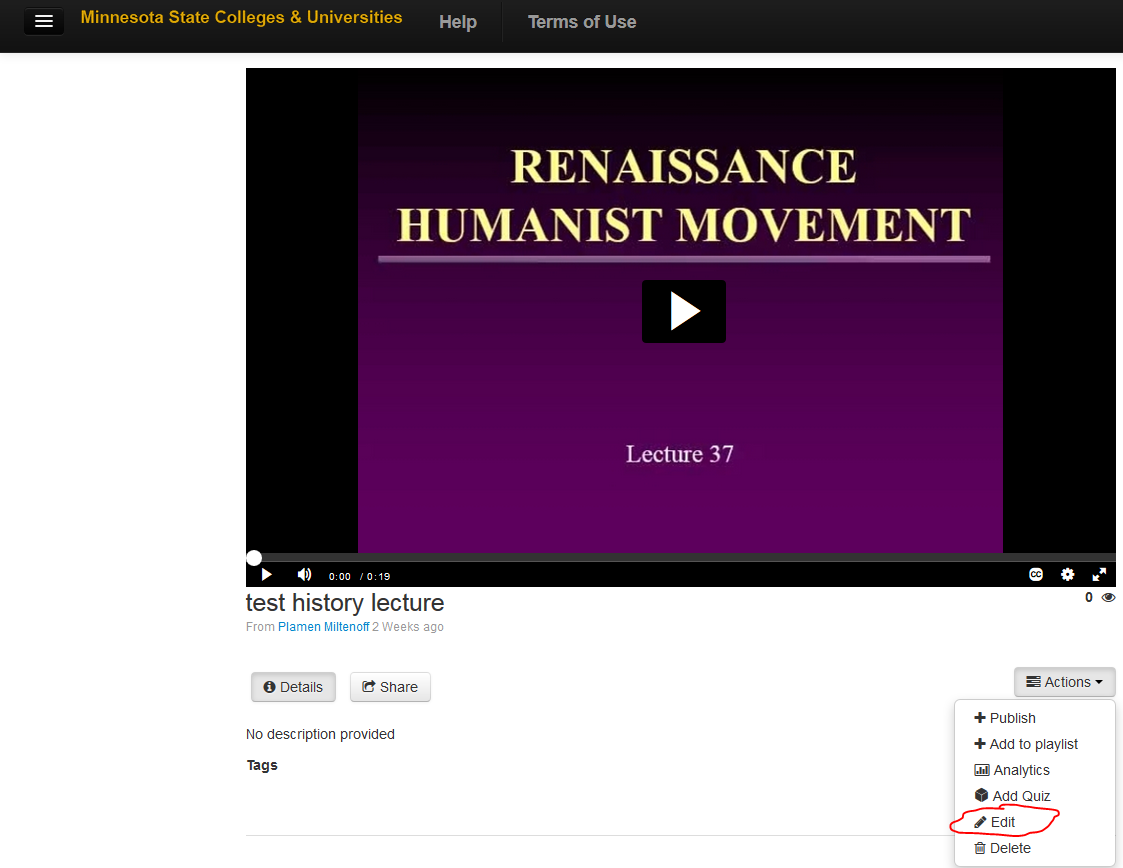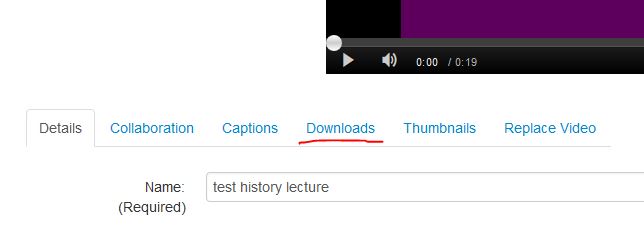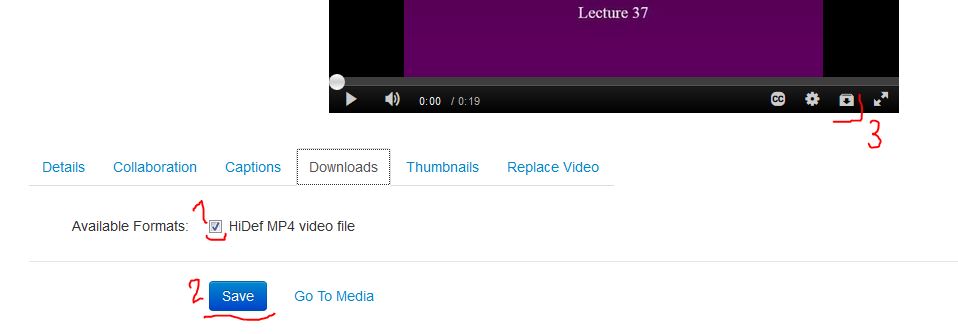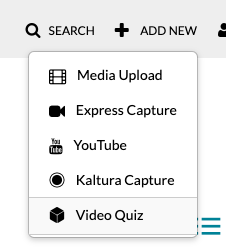[technology] MnSCU Special Interest Group – New October Webinar – Leveraging MnSCU MediaSpace Through Integration With Cloud-based Lecture Capture
Join us next Tuesday, October 27th from 12:00 PM to 1:00 PM, for a special SIG Series webinar: Leveraging MnSCU MediaSpace Through Integration With Cloud-based Lecture Capture
Are you looking for a more affordable and sustainable way to capture classroom lectures? Or perhaps that is not even an option due to the on-going costs. Riverland recently replaced its Echo360 system by paring AV-to-IP encoders/decoders with a centrally located array of capture devices, which are integrated with MnSCU MediaSpace. This eliminates the need for a dedicated capture device in each room, as well as the on-going licensing costs of proprietary lecture capture systems. Join us as J.C. Turner shows us how the system works and how you can add this to your campus.
J.C. Turner, Ph.D., is the Director of Instructional Technology and Intellectual Property at Riverland Community College. He has more than 25 years of experience in higher ed, including 15 years of university teaching experience at the graduate and undergraduate levels in electronic media, information and telecommunications, video production, and multimedia authoring. He oversees the library and Office of Instructional Technology, and serves as Riverland’s intellectual property officer and Quality Matters coordinator.
Register for the webinar at http://www.eventbrite.com/o/minnesota-online-quality-initiative-7290950883. Please forward this invitation to others on your campus who might be interested.
getting an error message when uploading a recording on MediaSpace that says “Error while uploading: XPath expression exception evaluating result” and then gives you a choice to “Retry” or “Exit”.
From: “Timothy P. VanLoon” <tvanloon@SOUTHEASTMN.EDU>
Date: September 5, 2014 at 9:29:59 AM CDT
To: Desire2Learn Campus Trainers <d2lcampustrainers@lists.mnscu.edu>
Subject: RE: MediaSpace error meaning
Reply-To: “Timothy P. VanLoon” <tvanloon@SOUTHEASTMN.EDU>
Thanks Kathy. I agree it is a great system and seems to be very reliable and I like working with it as it is very user friendly. However, in this last week now I have seen this error message come up twice for faculty and I would like answers and I haven’t gotten any so that is why I sent it out on the listserve today to see if anybody else has seen the error and find out what they know.
We have been using Tegrity for the last 6-8 years and it can be a real pain to work with (as well as very expensive) so I am trying to wean the faculty off of Tegrity on onto MediaSpace, but if word gets out that MediaSpace is throwing them error messages it just make the hill that much steeper for me in this uphill battle to get faculty to try something new.
Thanks,
Tim
From: Kathy Grady [mailto:KGrady@nhcc.edu]
Sent: Friday, September 05, 2014 8:24 AM
To: Timothy P. VanLoon; Desire2Learn Campus Trainers
Subject: RE: MediaSpace error meaning
Hi Tim – I have not seen this error – I just tried a couple videos, one an mp4 and the other an mov file and they uploaded and processed just fine. We have several people using MediaSpace with very little issues so I guess when you run into these issues – is to email Todd Digby and turn in a HD ticket as soon as you get notice of the issue.
Even with these strange things that periodically happen – I am thankful for this system, it has been a long time in coming. Please take it from me, who managed media streaming servers locally for five years, it was a royal pain and not an easy service to keep functioning at all times.
Kathy
Kathy Grady
Learning Systems & Services Manager
North Hennepin Community College
7411 85th Ave N
Brooklyn Park, Mn 55445
763-424-0743
kathy.grady@nhcc.edu
From: Timothy P. VanLoon [mailto:tvanloon@SOUTHEASTMN.EDU]
Sent: Friday, September 5, 2014 7:57 AM
To: Desire2Learn Campus Trainers
Subject: MediaSpace error meaning
Has anyone else experienced getting an error message when uploading a recording on MediaSpace that says “Error while uploading: XPath expression exception evaluating result” and then gives you a choice to “Retry” or “Exit”. Hitting “Retry” seems to do nothing and I have not selected “Exit”. The recording does finish uploading and the message comes up saying it finished uploading and then the recording seems to play normally but the message box does not go away unless you close it out. I would like to know what this message is about and what I am supposed to tell faculty when this happens and will the recording continue to upload properly and playback properly every time. I any pushing hard to get faculty moved over to using MediaSpace and this is a little unsettling when I tell them it is a reliable recording/playback tool and then they get this message and I don’t know what to tell them except wait and it should end up fine.
Thanks,
Tim
---
You are currently subscribed to d2lcampustrainers as: kathy.grady@nhcc.edu.
To unsubscribe send a blank email to leave-2134714-34868.759a19b71fb33f978ce71ce24932e9b7@lists.mnscu.edu
---
You are currently subscribed to d2lcampustrainers as: pmiltenoff@stcloudstate.edu.
To unsubscribe send a blank email to leave-2134729-181886.d8f4486eedebad041ae06a403d1da31b@lists.mnscu.edu
Getting Started with MediaSpace v5 (PDF attachment)
From: Todd Digby <Todd.Digby@so.mnscu.edu>
Date: Thursday, October 31, 2013 10:52 AM
To: Todd Digby <Todd.Digby@so.mnscu.edu>
Subject: MnSCU Mediaspace Update – New Version – New URL
Hello MnSCU Mediaspace user,
We have upgraded MediaSpace systems and now have a new permanent address for MnSCU MediaSpace http://mediaspace.mnscu.edu
You will also see that there have been some changes to this version from the previous version. Just use your StarID to login, all you existing videos will be available in the site. There are a few new features in this version of Mediaspace. I have also updated the getting started document that I originally distributed to make adjustments for the new version. Once we are confident that you have made the transition to the new version, we will start broadening the use to other campuses and to faculty / staff use. Expect more announcements to come over the next couple weeks.
New Features
Direct links to videos can now be used. The steps to follow
- Click on your Video title from your My Media listing
- Click on the Action button (below the video player box, to the right)
- Select “+ Publish”
- Chance the privacy settings to “Unlisted”
- Click on the “Share” button
- Copy link and send out.
Embedding can use an Iframe or the standard legacy embed.
- The embedding feature will now have the necessary security measures in place so that the D2L mixed content issues will not be present.
Downloading a copy of the video
- You can now download a copy of the video from MediaSpace. If you are the owner of the video, when you select the “Edit” screen for the video, the player will have a “Download” option in the middle of the screen. This will allow an MPEG moving file to be downloaded to your workstation. This is only available in the “Edit” screen player, so only the owner of the video will have the ability to download it from MediaSpace.
Thanks,
Todd
_______________________________
Todd R. Digby
System Director of Academic Technology
Minnesota State Colleges and Universities
30 7th St. E., Suite 350 | St. Paul, MN 55101-7804 | 651-201-1812 l 612-803-4922 (cell)
todd.digby@so.mnscu.edu | http://www.asa.mnscu.edu/academictechnology
Information Media and Digital Literacy for GLST 195: Global Society & Citizenship
Instructor: Prof. Chuks Ugochukwu Per Syllabus:
COURSE LEARNING OUTCOMES:
The course meets Liberal Education Program (LEP), Goal Area 8: Global Perspective; and Goal Area 9: Ethical and Civic Responsibility objectives
Goal Area 8: Global Perspective. Objective: Develop a comparative perspective and understanding of one’s place in a global context.
Students will be able to:
- Describe and analyze political, economic, and cultural elements which influence relations of states and societies in their historical and contemporary dimensions.
- Demonstrate knowledge of cultural, social, religious and linguistic differences.
- Analyze specific international problems, illustrating the cultural,economic, and political differences that affect their solution.
- Understand the role of a world citizen and the responsibility world citizens share for their common global future.
Goal Area 9: Ethical and Civic Responsibility Objective: Understand and evaluate ethical or civic issues and theories and participate in active citizenship or ethical judgment
OUR HUSKY COMPACT
Our Husky Compact is a bond shared by St. Cloud State University and its students that a SCSU education will prepare students for a life of growth and fulfillment – intellectually, professionally, and personally. When students graduate with an SCSU education, they will:
- Think Creatively and Critically
- Seek and Apply Knowledge
- Communicate Effectively
- Integrate Existing and Evolving Technologies
- Engage as a Member of a Diverse and Multicultural World
- Act with Personal Integrity and Civic Responsibility
+++++++++++++++++++++
Week ???: Information – Media and Digital Literacy
Most students can’t tell fake news from real news, study shows
Read more: https://blog.stcloudstate.edu/ims/2017/03/28/fake-news-3/
Module 1
video to introduce students to the readings and expected tasks
https://mediaspace.minnstate.edu/media/GLST+195+Module+1/1_32242qua
- Fake News / Misinformation / Disinformation
- Definitions
- Fake news, alternative facts
https://blog.stcloudstate.edu/ims?s=fake+news
https://blog.stcloudstate.edu/ims?s=alternative+facts
Mini-Assignment: After reading the information from the links above, take a minute to write out your own definition of 1. Fake News 2. Alternative Facts
-
-
- Misinformation vs disinformation
https://blog.stcloudstate.edu/ims/2018/02/18/fake-news-disinformation-propaganda/
Mini-Assignment: After reading the information from the links above, take a minute to write out your own definition of 1. Misinformation 2. Disinformation. What are their main characteristics? How do they differ?
-
-
-
- Propaganda
Mini-Assignment: What is Propaganda? How do misinformation, disinformation, fake news and alternative facts fit into the process of propaganda?
-
-
-
- Conspiracy theories
https://blog.stcloudstate.edu/ims?s=conspiracy+theories
Mini-Assignment: Using the information from the links above, can you establish the connection between conspiracy theories, propaganda, mis- and disinformation, fake news, alternative news and social media?
-
-
-
-
- Bots, trolls
https://blog.stcloudstate.edu/ims/2017/11/22/bots-trolls-and-fake-news/
https://blog.stcloudstate.edu/ims/2020/04/30/fake-social-media-accounts-and-politicians/
https://blog.stcloudstate.edu/ims/2020/01/20/bots-and-disinformation/
Mini-Assignment: using the info from the links above and/or information you have collected, can you define the role of bots and trolls in social media in regard to propaganda and conspiracy theories?
-
-
-
- Clickbait
Filter bubbles, echo chambers
(8 min) video explains filter bubbles
https://www.ted.com/talks/eli_pariser_beware_online_filter
Mini-Assignment:: based on your own information and experience, as well as the information offered in the links, can you define your own resistance to clickbaits?
Assignment: which challenges do you identify with?
The Challenge of Teaching News Literacy:
https://soundcloud.com/edsurge/the-challenge-of-teaching-news-literacy
25 min podcast.
In a short paragraph, identify the issues you see as important to address in order to improve your own news literacy.
time to accomplish the assignment: ~45 min (including listening to the podcast).
- Why is it important to understand these processes?
Assignment: why is it important:
In a short paragraph, share your initial feeling about Fake News / Misinformation / Disinformation. 1. Do you think, it is important at all? 2. If yes, why; if not, why. 3. If yes, what is the importance, the impact?
time to accomplish the assignment: ~5-10 min
- How to deal with these processes
- how do we apply hands-on critical thinking to withstand these processes?
- What is critical thinking
disciplined thinking that is clear, rational, open-minded, and informed by evidence: https://www.dictionary.com/browse/critical-thinking
- Ability to research
Ability to find reliable information
- Popular media
How to spot fake news:
https://blog.stcloudstate.edu/ims/2017/03/15/fake-news-bib/
Can machines create fake news?
https://blog.stcloudstate.edu/ims/2019/10/24/fake-news-generator/
Can machines “clean up” fake from real?
https://blog.stcloudstate.edu/ims/2020/11/16/identifying-fake-news-by-90/
What can humans do to distinguish fake from real? Consider these five factors:
https://blog.stcloudstate.edu/ims/2017/06/26/fake-news-real-news/
Considering the second factor (who published it), here is a scale to consider when evaluating the veracity of your sources:
https://blog.stcloudstate.edu/ims/2017/08/13/library-spot-fake-news/
(can you find your favorite magazine/newspaper on the graphic?)
https://blog.stcloudstate.edu/ims/2016/12/14/fake-news-2/
(can you find your favorite news organization on the graphic?)
Factcheckers/Factchecking Organizations:
https://blog.stcloudstate.edu/ims/2017/03/28/fake-news-resources/
https://blog.stcloudstate.edu/ims/2016/12/14/fake-news-2/
- Peer-reviewed literature
Similarly to the assessment of popular information sources, academia requires vigorous vetting if the sources you will be using for your academic work. In the 21st century, your ability to find information in peer-reviewed journals might not be sufficient to assure accurate and reliable use of information from those resources for your research and writing. After your selection of peer-reviewed literature, you must be able to evaluate and determine the veracity and reliability of those sources.
How do you evaluate a source of information to determine if it is appropriate for academic/scholarly use. There is no set “checklist” to complete but below are some criteria to consider when you are evaluating a source.
Here is a short (4 min) video introducing you to the well-known basics for evaluation of academic literature:
https://youtu.be/qUd_gf2ypk4
- ACCURACY
- Does the author cite reliable sources?
- How does the information compare with that in other works on the topic?
- Can you determine if the information has gone through peer-review?
- Are there factual, spelling, typographical, or grammatical errors?
- AUDIENCE
- Who do you think the authors are trying to reach?
- Is the language, vocabulary, style and tone appropriate for intended audience?
- What are the audience demographics? (age, educational level, etc.)
- Are the authors targeting a particular group or segment of society?
- AUTHORITY
- Who wrote the information found in the article or on the site?
- What are the author’s credentials/qualifications for this particular topic?
- Is the author affiliated with a particular organization or institution?
- What does that affiliation suggest about the author?
- CURRENCY
- Is the content current?
- Does the date of the information directly affect the accuracy or usefulness of the information?
- OBJECTIVITY/BIAS
- What is the author’s or website’s point of view?
- Is the point of view subtle or explicit?
- Is the information presented as fact or opinion?
- If opinion, is the opinion supported by credible data or informed argument?
- Is the information one-sided?
- Are alternate views represented?
- Does the point of view affect how you view the information?
- PURPOSE
- What is the author’s purpose or objective, to explain, provide new information or news, entertain, persuade or sell?
- Does the purpose affect how you view the information presented?
In 2021, however, all suggestions above may not be sufficient to distinguish a reliable source of information, even if the article made it through the peer-reviewed process. In time, you should learn to evaluate the research methods of the authors and decide if they are reliable. Same applies for the research findings and conclusions.
Assignment: seeking reliable information
From your syllabus weekly themes: 1. Food; 2. Health; 3. Energy; 4. Environment; 5. Security, chose a topic of your interest.
For example: Food: raising cattle for food contributes to climate changes, because of the methane gas, or Health: COVID is the same (or not the same) as the flu; or Energy: Fossil energy is bad (or good) for the environment; etc.
Please consult with me (email me for a zoom appointment: pmiltenoff@stcloudstate.edu), if you need to discuss the choice and narrowing down of the topic.
Once you decide on the topic, do the research by collecting four sources of information:
The first couple of sources will be from popular media, whereas each of the two articles will be having an opposite approach, arguments and understanding of the issue. For example, one article will claim fossil energy is bad for the environment and the other one will argue fossil fuel has insignificant impact on climate change. You must be able to evaluate the veracity and the leaning of each source. The source can be a newspaper or magazine article, video (TV or Social Media), audio (podcasts, TV, etc.), presentations (PowerPoint, SlideShare, etc.).
Having troubles finding opposing resources? Feel welcome to search for your topic among these news outlets on the conservative side:
https://www.conservapedia.com/Top_Conservative_news_websites
and the https://aelieve.com/rankings/websites/category/news-media/top-liberal-websites/
In the same fashion, you will evaluate the second couple of sources from peer-reviewed journals. Each source will have different approach, argument and understanding of the issue and you must evaluate the robustness of the research method.
time to accomplish the assignment: ~30 min
Module 2 (video to introduce students to the readings and expected tasks)
- Digital Citizenship, Global Citizenship and Multiculturalism
- Definitions
- Global Citizenship
seek global sources:
start reading:
e.g. start following and reading several news outlets from other countries and with time, you should be able to detect differences in opinions and facts presented at those outlets and your current sources for information:
Spiegel International (German, left-leaning)
https://www.facebook.com/spiegelinternational
Le Monde Diplomatique
https://www.facebook.com/mondediplo
El Pais (Spanish, left leaning)
https://www.facebook.com/elpaisinenglish
Moscow Times (Russian, left leaning)
https://www.facebook.com/MoscowTimes
The Epoch Times (Chinese, far-right)
https://www.theepochtimes.com/
Start watching (smart phone, laptop) news feeds, live or vlog (video blog):
Africa News
https://youtu.be/NQjabLGdP5g
Nigeria Live (you can seek any other country on YouTube by typing the name of the country adding “live”)
https://youtu.be/ATJc9LyPZj8
Al Jazeera in English
https://youtu.be/GXfsI-zZO7s
Deutsche Welle
https://www.youtube.com/user/deutschewelleenglish
BBC
https://www.youtube.com/user/bbcnews
Russia Today
https://www.youtube.com/user/RussiaToday
China Today
https://www.youtube.com/channel/UCBOqkAGTtzZVmKvY4SwdZ2g
India News
https://www.youtube.com/user/IndiaTV
you can also follow specific people’s vlogs, e.g.
Alexei Navalny’s vlog has English subtitles
https://www.youtube.com/user/NavalnyRu
France 24 Live
https://youtu.be/HeTWwH1a0CQ
Start listening (smart phone, laptop):
BBC
https://play.google.com/store/apps/details?id=uk.co.bbc.android.iplayerradio&hl=en_US&gl=US (Android app)
https://apps.apple.com/gb/app/bbc-sounds/id1380676511 (iOS app)
Deutsche Welle
https://play.google.com/store/apps/details?id=com.exlivinapps.deutschewelleradioappde&hl=en_US&gl=US (Android app)
https://apps.apple.com/us/developer/deutsche-welle/id305630107 (iOS app)
Assignment:
Global Citizenship and Multiculturalism and Information and Media Literacy
Study the following tweet feed
https://blog.stcloudstate.edu/ims/2021/02/18/facebook-google-australia/
If the information from the tweet feed is insufficient, research the issue by seeking reliable sources. (In a short paragraph defend your choice of reliable sources).
What do you see as more important issue: the Facebook stance that it can be a subject of Australian law or the Australian government stance that Facebook is interfering in Australian life with its news delivery? Is Facebook a news outlet or a platform for news outlets? Does Facebook need to be regulated? By who; each country do have to regulate Facebook or Facebook needs to be regulated globally?
time to accomplish the assignment: ~30 min
Module 3 (video to introduce students to the readings and expected tasks)
- Assistance for work on the final project / paper
++++++++++++++++++++++++++
Here a list of additional materials and readings on Fake News
https://www.ted.com/talks/eli_pariser_beware_online_filter




